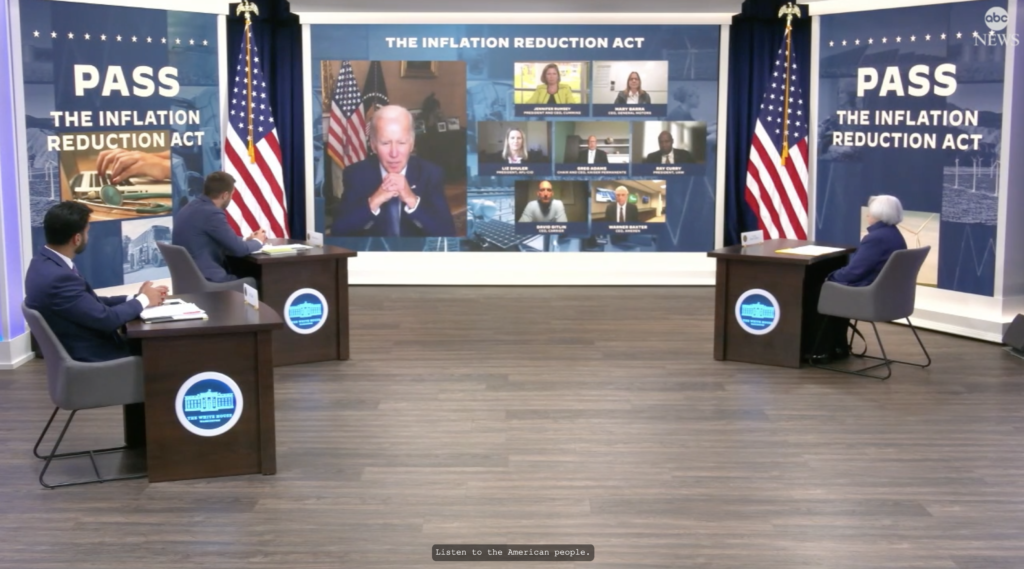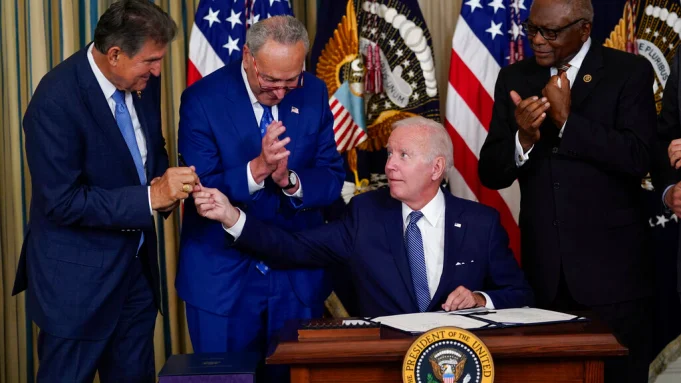We have prepared a comprehensive recap from top senior tax and economic correspondents across the country:

“Biden’s Corporate Tax Hike in ‘The Inflation Reduction Act’ won’t hurt most U.S. companies. Instead, it could help millions of Americans as it doubles the refundable research and development tax credit for small companies, raising it from $250,000 to $500,000. The credit can be applied against payroll taxes and a wide variety of expenses, including product development and technology.” Forbes’ Rhett Buttle wrote.
After more than a year of fraught negotiations, President Joe Biden on Tuesday signed into law the Inflation Reduction Act, a long-awaited ambitous bill passed by the Democrats at the U.S. House and Senate. The historic bill will invest $370 billion in spending and tax credits in low-emission forms of energy to fight climate change, stable health care premiums for millions and significant savings on power bills for most Americans, Vox Senior Correspondent Ellen Loanes reported..
Political and economic experts had explained that Democrats approved a bill that it’s smaller than what they initially dreamed of when Joe Biden took office in 2021. Nevertheless, the H.R.5376 – Inflation Reduction Act of 2020 is still ambitious as it contains historic provisions to fight climate change and takes steps toward fulfilling the eternal Democratic policy goal: letting Medicare negotiate the prices of many prescription drugs, Loanes wrote. “The law could influence what kind of car you buy and how you heat your home. This bill will also prevent significant price increases this year for some people who purchase individual health insurance. And if you aren’t paying your taxes, there’s a better chance that the IRS will find out.”
Please note that although the law was named ‘The Inflation Reduction Act,’ it doesn’t mean that it will lower inflation immediately. However, the law is expected to reduce the federal budget deficit by about $300 billion over ten years. The bill also aims to reduce health costs (extends federal health-insurance subsidies, allows the government to negotiate prescription drug prices for seniors on Medicare), tamp down on inflation, and impose a minimum tax rate of 15 percent on ultra-profitable companies. This minimum corporate tax rate would help pay for large investments across climate and health care. However, as Washington Post correspondent Kevin Schaul wrote, it’s important to note that “the minimum tax conflicts with a hallmark of corporate taxes in America: deductions and credits ratified by Congress”: Tax credits and deductions are purposefully designed as tools to incentivize certain behaviors. But because they reduce companies’ tax bills, they stand to chip away at the effectiveness of a minimum tax. Companies can still use carve-outs for research and development, investment expenses and others to lower their tax bills. Democrats’ marquee climate proposal comes in the form of tax breaks — which are also exempted from the corporate minimum tax rate. ‘Because of these exemptions, it would remain possible for profitable corporations to achieve a tax rate below 15 percent,‘ the executive vice president at the Tax Foundation, a right-leaning think tank, Daniel Bunn, said in an email to the Washington Post.

Here’s what’s in the law and what it would mean for your life in the years ahead:
-
The biggest effort to tackle climate change–ever
The Inflation Reduction Act is unprecedented. This law is the biggest thing the U.S. has ever done to tackle climate change, and climate makes up the largest share of its spending: approximately $370 billion, like mentioned above. Some estimates it will be enough to cut climate pollution by 40 percent by 2030 –cleaner air– that’s slightly less dramatic than it sounds; the decrease is compared to 2005 levels, when emissions peaked. Even without new policy, the U.S. still would have been on track to cut 20 percent of emissions by 2030.
The biggest share of the funding goes to tax credits and rebates for a host of renewable technologies like solar panels, wind turbines, heat pumps, energy efficiency, and electric vehicles. The law also put funding into energy efficiency at industrial sites that can help lower the sector’s hefty carbon footprint, while dedicating some funds to forest and coastal restoration.
Beyond cutting climate pollution, the clean energy investments could also make a dent in inflation. According to Robbie Orvis, senior director at Energy Innovation, rising energy prices have driven roughly a third of the 9 percent rise in the overall Consumer Price Index this past year. By helping Americans become less reliant on fossil fuels, the spending helps ease the global oil crunch and cut consumer bills,” Vox’s Emily Stewart, Li Zhou, and Rebecca Leber reported.
As the global temperature continues to rise, the Scientific comunity welcomes this massive climate and tax law, several U.S. agencies, including the National Oceanic and Atmospheric Administration (NOAA) and the Department of Energy (DOE), will see a significant influx of cash. While the scientists around the world applaud the legislation, they also acknowledge that still more work is needed to counter global warming, according to nature magazine.
The Inflation Reduction Act also includes thousands of dollars in tax credits and rebates for everyone who buys electric vehicles, install solar panels or make other energy-efficient upgrades to their homes.
-
Corporate minimum tax rate that would only apply to companies that reported to shareholders an annual average of $1 billion in annual profit over three years
According to the Join Committee on Taxation, a nonpartisan congressional body that analyzes tax bills, the minimum 15 percent tax proposal would raise $220 billion over 10 years. More than 250 companies in the S&P 500 averaged more than $1 billion in pretax income over the last three years, according to a Washington Post analysis of Calcbench data. Of those, 83 paid less than 15 percent in income tax globally. The list includes tech companies such as Amazon and Intel, banks like Bank of America and U.S. Bancorp, telecom giants Verizon and AT&T. UPS, for instance, had a pretax income of $8 billion and a tax rate of 14.6 percent, or Berkshire Hathaway that had a pretax income of $89.1 billion and paid for 2019 to 2021 a tax rate of 5.9%. The full list here in this link via the Washington Post analysis of Calcbench data.
Washington Post Senior correspondent Kevin Schaul explains that the rate is calculated according to global income, meaning a company could, in theory, “have a domestic effective tax rate below 15 percent as long as their foreign profits were taxed higher,” Kyle Pomerleau, a senior fellow at the American Enterprise Institute, a right-leaning think tank, told him in an email.
“To gain the support of Sen. Kyrsten Sinema (D-Ariz.), Democrats amended their minimum rate proposal to exclude deductions for certain investments and exempt firms owned by private equity. Those last-minute changes will further help some ultra-profitable corporations to pay less than the minimum rate,” Schaul wrote.
Closing a loophole to make ultra-profitable corporations pay more taxes
Senate Democrats note that while the current corporate tax rate is 21 percent, dozens of major companies like Amazon and ExxonMobil, pay much less than that. Originally, the provision was expected to raise $313 billion, though new carveouts were added to win Sen. Kyrsten Sinema’s (D-AZ) vote, which give manufacturers and private equity firms more leeway when it comes to the new minimum tax rate. Those changes are likely to reduce the revenue this measure will bring in.
There is also a 1 percent excise tax on corporations’ stock buybacks, which are currently not subject to any taxes at all. That excise tax is estimated to raise roughly $73 billion in revenue.
-
Reduce the costs of prescription drugs
For decades, Democrats have told voters that they will take on policies that reduce the costs of prescription drugs, only to be blocked by republicans and fall short, Vox reported. Now, this law allows Democrats to finally fulfill that campaign promise by enabling Medicare to negotiate on prescription drugs — a major change that could lead to significant cost reductions for a small subset of drugs.
Senate Parliamentarian Elizabeth MacDonough, whose approval was needed for Democrats to move forward with the reconciliation process, signed off on the Medicare portion of the bill, however, she refused to agree to a provision that would have lowered prescription costs for Americans on private insurance. Because of that decision, pharmaceutical companies will be required to issue rebates if they try to raise the price of a drug at a rate higher than inflation. But that requirement only applies to drug prices for Medicare beneficiaries, and not those for people who are currently covered by private insurance. The parliamentarian also struck another provisionthat would cap out-of-pocket insulin costs at $35 a month for those with private insurance. Democrats were able to keep an insulin cap of $35 a month for those covered by Medicare.
-
More money for the IRS
Vox’s senior correspondents described, “raising taxes can be hard, politically. So Democrats are, in part, taking a different approach”
-
Getting people to pay the taxes they already owe. The Inflation Reduction Act agreement increases funding for the IRS so that it can up enforcement and go after unpaid taxes. Senate Democrats, drawing from Congressional Budget Office numbers, estimate that, by investing $80 billion in the IRS over a decade, it will collect $203 billion. This was also part of a proposal put out by the Biden administration in 2021. The IRS estimated that from 2011 to 2013, the “tax gap” — meaning the difference between what people pay in taxes and what they owe in taxes — amounted to $441 billion each year, or around 16 percent of total tax liability those years.
-
One 2019 paper by Natasha Sarin, now at the Treasury Department, and economist Larry Summers put the tax gap at $7.5 trillion from 2020 to 2029, with most of that figure linked to the wealthy. They calculated that underreporting was five times higher among people making more than $10 million annually than for those making under $200,000. Senate Democrats say that none of the funds directed to the IRS will be intended to increase taxes on anyone making under $400,000.
How will ‘The Inflation Reduction Act’ influence Small Business Owners? We thought you’d never ask!

Here is a top five summary of the ‘Inflation Reduction Act’ and what it means for small businesses, according to Forbes contributor Rhett Buttle:
1. It will not raise taxes on the vast majority of small business or working families. It invests in them
Buttle explains that this legislation is not funded in any way by personal tax increases on small business or working families making under $400,000, which is roughly 98% of all Americans. Instead, it makes crucial investments in them. Recently, 126 of the country’s top economists, including seven Nobel laureates and two former U.S. Department of Treasury Secretaries, sent a letter to Congressional leaders supporting the Inflation Reduction Act, writing “These investments will fight inflation and lower costs for American families while setting the stage for strong, stable, and broadly-shared long-term economic growth.”
2. The bill significantly increases a crucial small business tax credit
The Inflation Reduction Act doubles the refundable research and development tax credit for small businesses, raising it from $250,000 to $500,000. The credit can be applied against payroll taxes and a wide variety of expenses, including product development and technology.
3. Increased funding for the IRS will not be used to target small businesses or working families
The bill does provide $80 billion in additional funding for the IRS, but this article about a recent tour of the IRS office in Austin highlights the dire situation for the IRS, which is utilizing technology from the 1970s to process IRS returns. While the additional funding could mean the hiring of additional IRS agents, they will be directed towards seeking revenue from taxpayers and large corporations making more than $400,000 a year who have used tax gimmicks to not pay their fair share — this would not be focused on middle class Americans. This was reinforced by the current IRS Commissioner Charles Rettig (a Trump appointee) who in a letter of support for the additional funding, stated, “these resources are absolutely not about increasing audit scrutiny on small businesses or middle-income Americans.” The IRS has been woefully underfunded for decades, which means wealthy corporations and individuals who can afford to hire expensive lawyers and accountants can game with little fear of IRS oversight. This will end that unfair advantage.
4. The legislation will make prescription drugs more affordable without hurting innovation
As mentioned before, The Inflation Reduction Act expands Medicare benefits by capping out-of-pocket drug costs at $2,000 and allowing Medicare to negotiate prices for 100 drugs that it selects. It also sets provisions that save the average Affordable Care Act enrollee $800 a year in the marketplace. Dr. Aaron S. Kesselheim, a professor of medicine at Harvard Medical School and Brigham and Women’s Hospital, said he believed the measure would spur innovation, by “encouraging investment in important new products rather than encouraging pharmaceutical companies to try to keep pushing the same product and delaying generic entry as long as possible.”
This is widely supported on Main Street. A recent Small Business for America’s Future survey found that more than 80% of small business owners support allowing Medicare to negotiate prescription drug prices, capping out-of-pocket drug costs for seniors at $2,000, and ensuring Affordable Care Act premiums are affordable for families.
5. The Inflation Reduction Act will not raise gas prices, but will move us towards energy independence
The war in Ukraine has highlighted how important it is that America and its allies pursue energy independence. Too many small businesses have felt the effects of extreme weather that have impacted their businesses and cost them too much. This law will begin to make an investment in clean energy. For example, it includes 10 years of tax credits to make modifications like heat pumps and rooftop solar more affordable, and provides $4,000 in consumer tax credits for lower- and middle-income individuals to buy used electric vehicles.
One of the ways this bill is funded is through a tax increase of 16.4 cents-per-barrel tax on crude oil and imported petroleum products. When one looks at how much a barrel of crude oil produces, it is clear that this increase will not be passed along to the consumer. A barrel of crude oil is about 42 gallons and is used to produce about 19 U.S. gallons of gasoline, 10 gallons of diesel, four gallons of jet fuel, and nine gallons of other oil products. This means that the increase in the tax will be only $0.0039 cents per gallon, with the price of gas having dropped by $1 per gallon since its high in June.
In the coming weeks, I will be doing deep dives on some of the key provisions in the Inflation Reduction Act and how small businesses can utilize them. But right now the overarching message is that this legislation is a step forward for Main Streets and families across the country, despite the myths that are circulating.
DISCLAIMER: THIS BLOG POST IS A SUMMARY OF MULTIPLE PIECES PUBLISHED ON AUGUST 16, 2022 BY VOX MEDIA (By SENIOR CORRESPONDENTS Emily Stewart, Li Zhou, & Rebecca Leber) NYTIMES (By Jim Tankersley) WASHINGTON POST (By Kevin Schaul), and FORBES (By Rhett Buttle)
For inquiries regarding how this law could impact your long-term plans and/or your business, please contact us here, or schedule your virtual appointment [telephone or zoom] with one of our CPAs by clicking here and following the instructions.














